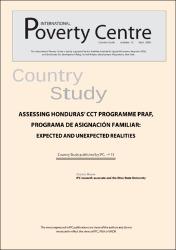Please use this identifier to cite or link to this item:
https://repositorio.ipea.gov.br/handle/11058/15151Full metadata record
| DC Field | Value | Language |
|---|---|---|
| dc.contributor.author | Moore, Charity | |
| dc.date.accessioned | 2024-10-03T23:51:42Z | - |
| dc.date.available | 2024-10-03T23:51:42Z | - |
| dc.date.issued | 2008 | |
| dc.identifier.uri | https://repositorio.ipea.gov.br/handle/11058/15151 | - |
| dc.description.abstract | This Country Study investigates the evolution and current state of Honduras’ conditional cash transfer programme, known as PRAF, the Programa de Asignación Familiar. The details of the past and current programmes are examined closely, with special attention paid to what can be learned from the experiences. While the programme was originally intended to compensate poor households for the hardships imposed by structural adjustment, it has evolved into a programme focused on human capital development. In this respect, it is similar to other conditional cash transfer programmes. However, its history and the dual nature of the programme (one part based on an external loan and the other domestically driven) have hindered institutional transformation. Although there have been attempts to make the domestic programme more closely resemble the externally financed version of PRAF, this process has been hindered on several occasions. In fact, domestic programme co-responsibilities have been neither emphasized nor enforced in the past. While the current alignment of political and economic forces, both inside and outside the country, has given the programme the opportunity to positively transform itself, other factors run counter to this goal. Although the outcome of this transformation is yet to be fully determined, several important lessons can be learned from the experience of PRAF in Honduras. These relate to topics that include organizational alignment, targeting methodology, administration of transfers, programme evaluation, enforcement of co-responsibilities and supply-side complements to the programme. These issues are investigated so that other similar programmes can learn both the strengths and weaknesses of the Honduran experience. | en |
| dc.language.iso | en | |
| dc.title | Assessing Honduras’ CCT Programme PRAF, Programa de Asignación Familiar: Expected and Unexpected Realities | en |
| dc.type | Research Report | |
| dc.rights.holder | International Policy Centre for Inclusive Growth | |
| dc.rights.holder | United Nations Development Programme | |
| dc.location.country | Brasil | |
| dc.description.physical | 50 p. : il. | |
| dc.rights.type | Licença total exclusiva | |
| dc.rights.license | O texto e dados desta publicação podem ser reproduzidos desde que as fontes sejam citadas. Reproduções com fins comerciais são proibidas. | |
| dc.subject.keyword | Honduras’ CCT Programme PRAF | |
| dc.subject.keyword | Programa de Asignación Familiar | |
| dc.subject.keyword | realities | |
| ipea.access.type | Acesso Aberto | |
| ipea.researchfields | N/A | |
| ipea.classification | Cooperação Internacional. Relações Internacionais | |
| ipea.classification | Desenvolvimento Social | |
| Appears in Collections: | Publicações do IPC-IG | |
Files in This Item:
| File | Description | Size | Format | |
|---|---|---|---|---|
| en_IPCCountryStudy15.pdf | 280.35 kB | Adobe PDF |  View/Open |
Items in DSpace are protected by copyright, with all rights reserved, unless otherwise indicated.

